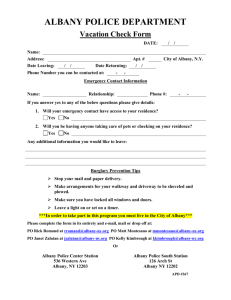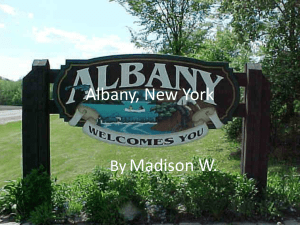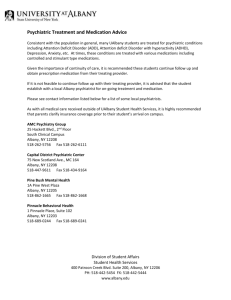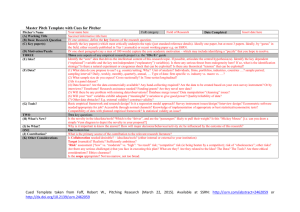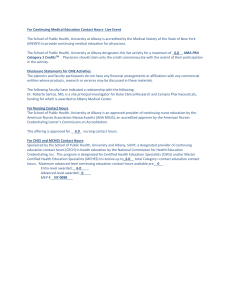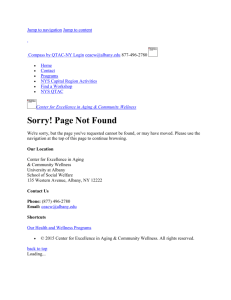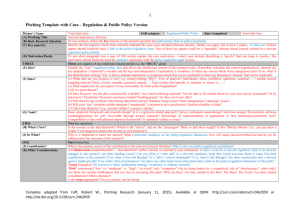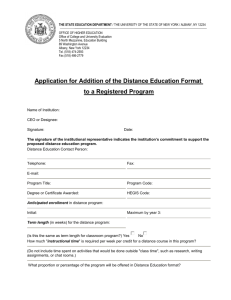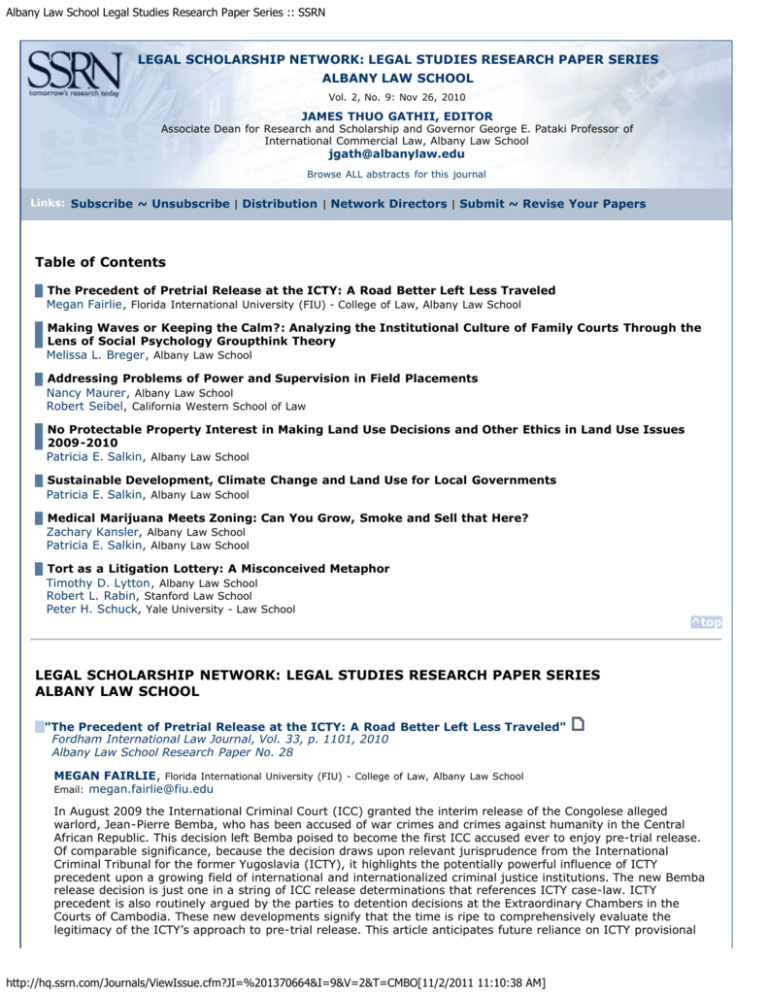
Albany Law School Legal Studies Research Paper Series :: SSRN
LEGAL SCHOLARSHIP NETWORK: LEGAL STUDIES RESEARCH PAPER SERIES
ALBANY LAW SCHOOL
Vol. 2, No. 9: Nov 26, 2010
JAMES THUO GATHII, EDITOR
Associate Dean for Research and Scholarship and Governor George E. Pataki Professor of
International Commercial Law, Albany Law School
jgath@albanylaw.edu
Browse ALL abstracts for this journal
Links: Subscribe ~ Unsubscribe | Distribution | Network Directors | Submit ~ Revise Your Papers
Table of Contents
The Precedent of Pretrial Release at the ICTY: A Road Better Left Less Traveled
Megan Fairlie , Florida International University (FIU) - College of Law, Albany Law School
Making Waves or Keeping the Calm?: Analyzing the Institutional Culture of Family Courts Through the
Lens of Social Psychology Groupthink Theory
Melissa L. Breger , Albany Law School
Addressing Problems of Power and Supervision in Field Placements
Nancy Maurer , Albany Law School
Robert Seibel , California Western School of Law
No Protectable Property Interest in Making Land Use Decisions and Other Ethics in Land Use Issues
2009-2010
Patricia E. Salkin, Albany Law School
Sustainable Development, Climate Change and Land Use for Local Governments
Patricia E. Salkin, Albany Law School
Medical Marijuana Meets Zoning: Can You Grow, Smoke and Sell that Here?
Zachary Kansler, Albany Law School
Patricia E. Salkin, Albany Law School
Tort as a Litigation Lottery: A Misconceived Metaphor
Timothy D. Lytton , Albany Law School
Robert L. Rabin, Stanford Law School
Peter H. Schuck, Yale University - Law School
^top
LEGAL SCHOLARSHIP NETWORK: LEGAL STUDIES RESEARCH PAPER SERIES
ALBANY LAW SCHOOL
"The Precedent of Pretrial Release at the ICTY: A Road Better Left Less Traveled" Fordham International Law Journal, Vol. 33, p. 1101, 2010
Albany Law School Research Paper No. 28
MEGAN FAIRLIE, Florida International University (FIU) - College of Law, Albany Law School
megan.fairlie@fiu.edu
Email:
In August 2009 the International Criminal Court (ICC) granted the interim release of the Congolese alleged
warlord, Jean-Pierre Bemba, who has been accused of war crimes and crimes against humanity in the Central
African Republic. This decision left Bemba poised to become the first ICC accused ever to enjoy pre-trial release.
Of comparable significance, because the decision draws upon relevant jurisprudence from the International
Criminal Tribunal for the former Yugoslavia (ICTY), it highlights the potentially powerful influence of ICTY
precedent upon a growing field of international and internationalized criminal justice institutions. The new Bemba
release decision is just one in a string of ICC release determinations that references ICTY case-law. ICTY
precedent is also routinely argued by the parties to detention decisions at the Extraordinary Chambers in the
Courts of Cambodia. These new developments signify that the time is ripe to comprehensively evaluate the
legitimacy of the ICTY’s approach to pre-trial release. This article anticipates future reliance on ICTY provisional
http://hq.ssrn.com/Journals/ViewIssue.cfm?JI=%201370664&I=9&V=2&T=CMBO[11/2/2011 11:10:38 AM]
Albany Law School Legal Studies Research Paper Series :: SSRN
release practices but questions their precedential value by noting instances of internal inconsistency, misleading
pronouncements and often sharp variances with international standards. To explicate the role of ICTY practices,
the article first considers the historical development of the right to release and relevant international human rights
law standards. It then scrutinizes the ICTY’s decision to make pre-trial detention the rule and release the
exception for all of its accused. The consequent effect on the burden of proof, which requires that accused persons
establish that their detention is unnecessary, is also critically assessed. Finally, the article tracks the progression of
provisional release at the ICTY, exploring and evaluating efforts that bring the ICTY provisional release scheme in
closer conformity with international standards.
"Making Waves or Keeping the Calm?: Analyzing the Institutional Culture of Family Courts Through the
Lens of Social Psychology Groupthink Theory" Law & Psychology Review, Vol. 34, p. 55, 2010
Albany Law School Research Paper No. 29
MELISSA L. BREGER, Albany Law School
This article argues that the institutional culture of Family Courts across the nation too often stifles conversation
and innovation and discourages loyal client-centered advocacy. The article presents the social psychology theory of
groupthink as a backdrop to hypothesize about the reasons such dynamics may exist and then suggests reform
ideas to change negative aspects of the court culture. A groupthink mentality can manifest itself among the
institutional players in Family Court, through monolithic thinking and myopic decision making, or through
entrenched resistance to outsiders or outside opinions. If left unchecked, this can result in “mindless conformity”
and a “collective misjudgment of serious risks” in case decisions, thus negatively impacting parties, in particular,
and the legitimacy of the court system, in general. The article aims to encourage further discussion and research
about Family Court institutional culture by providing a nexus to the groupthink literature and a framework for
organizing that discussion.
"Addressing Problems of Power and Supervision in Field Placements" Clinical Law Review, Vol. 17, p. 145, 2010
Albany Law School Research Paper No. 30
NANCY MAURER, Albany Law School
Email: nmaur@albanylaw.edu
ROBERT SEIBEL, California Western School of Law
Email: rf@cwsl.edu
Power dynamics play a role in all workplace relationships and are of particular significance in field placement
programs where such dynamics can have an impact on the learning opportunities for law students. This article
examines power issues in relation to supervision of law students. The article begins by exploring the parameters of
the problem through examples, and then examines the potential consequences of failing to address such issues in
field placement programs, including ethical ramifications. Faculty in field placement programs, who generally are
not responsible for client work product, have a unique opportunity to address power and supervision issues with
students and supervising attorneys. The goal of field placements is to equip students to fully exploit opportunities
in the programs, and to prepare them for workplace issues they may face in the legal workplace. The article
contains extensive suggestions for teaching about power in each phase of field placement programs, in hopes of
enabling students, faculty and supervisors to identify and address problems of power and supervision and to
maximize student learning.
"No Protectable Property Interest in Making Land Use Decisions and Other Ethics in Land Use Issues
2009-2010" Urban Lawyer, Vol. 42, p. 649, 2010
Albany Law School Research Paper No. 31
PATRICIA E. SALKIN, Albany Law School
Email: psalk@albanylaw.edu
This annual review of reported decisions and opinions focused on ethical considerations in land use planning and
decisionmaking, continues to highlight the hotly litigated issues surrounding conflicts of interest of various players
in the land use game.
"Sustainable Development, Climate Change and Land Use for Local Governments" New York Zoning Law and Practice Report, Vol. 11, No. 2, September/October 2010
Albany Law School Research Paper No. 32
PATRICIA E. SALKIN, Albany Law School
Email: psalk@albanylaw.edu
Over the last two years a number of state level initiatives in New York have been announced and enacted to
address sustainable development and climate change. For example, Governor Paterson issued a series of executive
orders: requiring a new State Energy Plan (which was adopted in December 2008); setting a goal of reducing
http://hq.ssrn.com/Journals/ViewIssue.cfm?JI=%201370664&I=9&V=2&T=CMBO[11/2/2011 11:10:38 AM]
Albany Law School Legal Studies Research Paper Series :: SSRN
greenhouse gas emissions by 80% by the year 2050 and calling for the creation of a climate action plan (the draft
plan is scheduled for release for public comment in November 2010; and creating an interagency committee on
sustainability and green procurement. In addition, he signed into law a number of new programs including: the
Green Residential Building Grant Program, the Green Jobs – Green New York Program, the Municipal Sustainable
Energy Loan Act, and improvements to net metering. While these and other State-level programs are vital to
achieving emissions reductions goals and promoting sustainable communities, New York’s cities, towns, and
villages have also been at work trying to develop and implement strategies to curb emissions. Municipalities are
choosing to adopt clear statements and action items in their comprehensive land use plans, and they are creating
climate change or sustainability task forces and developing strategies. Local governments are also enacting
regulations to promote green building and alternative energy development. This article introduces the ways in
which local governments have taken the lead in mitigating and preparing for climate change, focusing on the
manner in which local governments have incorporated climate change concerns into the local land development
regime.
"Medical Marijuana Meets Zoning: Can You Grow, Smoke and Sell that Here?" Planning and Environmental Law, Vol. 62, No. 8, August 2010
Albany Law School Research Paper No. 33
ZACHARY KANSLER, Albany Law School
PATRICIA E. SALKIN, Albany Law School
Email: psalk@albanylaw.edu
Fourteen states currently permit the medical use of marijuana, yet state statutes fail to account for the challenges
that confront municipal planners and officials whose agenda includes public health, safety and welfare of residents,
including minor children. The intensity of the problem is perhaps most evident in Los Angeles, where there are
approximately 800 dispensaries. Varying statutory approaches are provided for individuals to legitimately acquire
the drug - they may grow it themselves, they may obtain it from their primary caregiver, or they may obtain it
from a licensed dispensary. This raises a number of land use regulatory questions including: whether state law
preempts local zoning when it comes to growing, buying and using marijuana for medicinal purposes; whether
distance requirements, similar to those used in the regulation of adult business uses, can be utilized to regulate
the use of medical marijuana; and, what types of special use permit considerations may be appropriate for
considering activities related to the use of medical marijuana. In addition, questions as to whether growing and
sale of the drug may constitute a valid home occupation, and whether marijuana is or should be considered an
agricultural crop, and if so, what impact this would have on the relationship between agricultural regulation/policy
and zoning, suggest a growing number of legal unanswered land use law related questions in this emerging area.
This article pulls together information about how the municipalities in the fourteen states with legalized medical
marijuana are beginning to sort through and address the challenging land use issues that confront communities
faced with the growing, sale and use of the drug.
"Tort as a Litigation Lottery: A Misconceived Metaphor" Boston College Law Review, Vol. 52, p. 267, 2011
Stanford Public Law Working Paper No. 1690844
Yale Law & Economics Research Paper No. 416
Albany Law School Research Paper No. 34
TIMOTHY D. LYTTON, Albany Law School
Email: tlytt@albanylaw.edu
ROBERT L. RABIN, Stanford Law School
Email: RRABIN@LELAND.STANFORD.EDU
PETER H. SCHUCK, Yale University - Law School
Email: peter.schuck@yale.edu
For over forty years, tort reform proponents have disparaged the tort system as a lottery, arguing that it produces
arbitrary outcomes. The tort system, on this account, is both unfair and unpredictable. These criticisms have often
served as justification for reform proposals that would replace the tort system with some form of no-fault accident
insurance in order to provide fairer and more reliable compensation to accident victims.
In this short essay, we make three claims intended to discredit the lottery metaphor as applied to the tort system.
First, it obscures the tort system’s shortcomings more than it clarifies them. We agree, of course, that tort
outcomes produce horizontal inequities among accident victims with similar injuries, and that outcomes can also
be unpredictable. Our initial point is that the comparison to random selection by lottery both misrepresents how
the tort system decides cases and exaggerates its unpredictability.
Second, no-fault accident insurance plans fail to resolve the problem of arbitrariness, and this is true regardless of
how carefully the plan is designed. Such schemes do eliminate the fault requirement, which reform proponents
blame for creating unfair distinctions between accident victims with similar injuries and for making outcomes
unpredictable. But a no-fault system’s provision that claimants need only prove that their injuries are accidentrelated simply reproduces, by drawing different boundaries, the very problems of horizontal inequity and
unpredictability that reform proponents observe and denounce in the tort system.
http://hq.ssrn.com/Journals/ViewIssue.cfm?JI=%201370664&I=9&V=2&T=CMBO[11/2/2011 11:10:38 AM]
Albany Law School Legal Studies Research Paper Series :: SSRN
Third, arbitrariness is endemic in compensation systems. Of necessity, all compensation schemes set coverage
limits that inevitably create horizontal inequities among claimants with similar injuries and reduce predictability in
the many borderline cases. While addressing one kind of arbitrariness, no-fault alternatives cannot escape creating
other kinds of arbitrariness and having to make pragmatic tradeoffs among them that cannot be justified by any
uncontroversial principle. These structural necessities will entail some unpredictability and horizontal inequity.
We emphatically do not oppose no-fault alternatives to tort. The merits of one or another such scheme are not
before us in this essay. Quite the contrary; our point is that reformers must engage in more careful analysis and
comparison of the nature and sources of arbitrariness in all compensation systems before embracing one or
another of these systems. Doing so will discourage the kind of oversimplification that the lottery metaphor
encourages.
^top
Solicitation of Abstracts
The Albany Law School Research Paper Series contains and showcases the broad range of the scholarly work of its
vibrant and growing faculty. This scholarship takes theoretical, doctrinal, empirical and interdisciplinary approaches
and its coverage includes a variety of themes covering the national and the international as well as the local and state
issues. The papers are available online or through email distribution and can be accessed at
www.albanylaw.edu/scholarship
ALBANY LAW SCHOOL is an independent private school in the heart of New York State's capital since 1851. As the
oldest law school in New York and the oldest independent law school in the nation, the institution offers students an
innovative, rigorous curriculum taught by a committed faculty. Several nationally recognized programs - including the
Government Law Center and the Albany Law Clinic & Justice Center - provide opportunities for students to apply
classroom learning. Students have access to New York's highest court, federal courts and the state legislature, as well
as a thriving tech-based economy. With 9,000-plus alumni practicing in every state in the country, and several
continents, the employment rate for graduates has been well above the national average for law schools for the past
26 years. www.albanylaw.edu
To submit your research to SSRN, log in to the SSRN User HeadQuarters, and click on the My Papers link on the
left menu, and then click on Start New Submission at the top of the page.
Distribution Services
If your organization is interested in increasing readership for its research by starting a Research Paper Series, or
sponsoring a Subject Matter eJournal, please email: RPS@SSRN.com
Distributed by:
Legal Scholarship Network (LSN), a division of Social Science Electronic Publishing (SSEP) and Social Science
Research Network (SSRN)
Directors
LAW SCHOOL RESEARCH PAPERS - LEGAL STUDIES
BERNARD S. BLACK
Northwestern University - School of Law, Northwestern University - Kellogg School of Management, European
Corporate Governance Institute (ECGI)
Email: bblack@northwestern.edu
RONALD J. GILSON
Stanford Law School, Columbia Law School
Email: rgilson@leland.stanford.edu
Please contact us at the above addresses with your comments, questions or suggestions for LSN-LEG.
^top
Links: Subscribe to Journal | Unsubscribe from Journal | Join Site Subscription | Financial Hardship
Subscription Management
You can change your journal subscriptions by logging into SSRN User HQ. If you have questions or problems with
http://hq.ssrn.com/Journals/ViewIssue.cfm?JI=%201370664&I=9&V=2&T=CMBO[11/2/2011 11:10:38 AM]
Albany Law School Legal Studies Research Paper Series :: SSRN
this process, please email UserSupport@SSRN.com or call 877-SSRNHelp (877.777.6435 or 585.442.8170). Outside
of the United States, call 00+1+585+4428170.
Site Subscription Membership
Many university departments and other institutions have purchased site subscriptions covering all of the eJournals in
a particular network. If you want to subscribe to any of the SSRN eJournals, you may be able to do so without charge
by first checking to see if your institution currently has a site subscription.
To do this please click on any of the following URLs. Instructions for joining the site are included on these pages.
Accounting Research Network
Cognitive Science Network
Corporate Governance Network
Economics Research Network
Entrepreneurship Research & Policy Network
Financial Economics Network
Health Economics Network
Information Systems & eBusiness Network
Legal Scholarship Network
Management Research Network
Political Science Network
Social Insurance Research Network
Classics Research Network
English & American Literature Research Network
Philosophy Research Network
If your institution or department is not listed as a site, we would be happy to work with you to set one up. Please
contact site@ssrn.com for more information.
Individual Membership
(for those not covered by a site subscription)
Join a site subscription, request a trial subscription, or purchase a subscription within the SSRN User HeadQuarters:
http://www.ssrn.com/subscribe
Financial Hardship
If you are undergoing financial hardship and believe you cannot pay for an eJournal, please send a detailed
explanation to Subscribe@SSRN.com
^top
To ensure delivery of this journal, please add LSN@publish.ssrn.com (Legal Scholarship Network) to your
email contact list. If you are missing an issue or are having any problems with your subscription, please Email
usersupport@ssrn.com or call 877-SSRNHELP (877.777.6435 or 585.442.8170).
FORWARDING & REDISTRIBUTION
Subscriptions to the journal are for single users. You may forward a particular eJournal issue, or an excerpt from an
issue, to an individual or individuals who might be interested in it. It is a violation of copyright to redistribute this
eJournal on a recurring basis to another person or persons, without the permission of Social Science Electronic
Publishing, Inc. For information about individual subscriptions and site subscriptions, please contact us at
Site@SSRN.com
^top
http://hq.ssrn.com/Journals/ViewIssue.cfm?JI=%201370664&I=9&V=2&T=CMBO[11/2/2011 11:10:38 AM]
Albany Law School Legal Studies Research Paper Series :: SSRN
Copyright © 2011 Social Science Electronic Publishing, Inc. All Rights Reserved
http://hq.ssrn.com/Journals/ViewIssue.cfm?JI=%201370664&I=9&V=2&T=CMBO[11/2/2011 11:10:38 AM]

